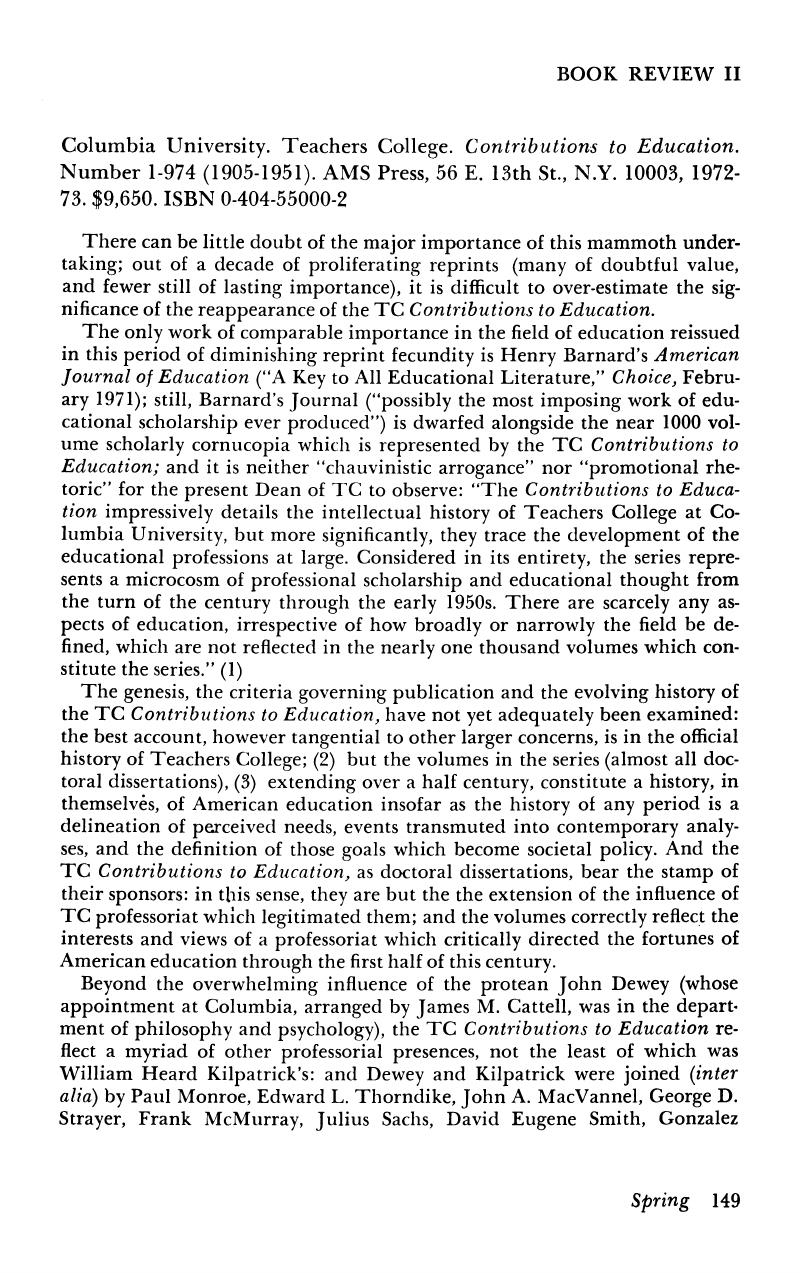No CrossRef data available.
Published online by Cambridge University Press: 24 February 2017

1. Schaefer, Robert J., “Regarding the Series,” Columbia University. Teachers College. Contributions to Education (New York: AMS Press, 1971). This AMS bibliographical brochure announcement of the reprinting of the series is an invaluable guide (listing of titles in numerical order; alphabetical listing of titles by authors), incomparably more useful than the series list in Baer, Eleanora A., Titles in Series (1953–60). Numbers 226 and 972 of the series were never published. A companion guide to dissertations completed at New York University's School of Education is Dossick, Jesse J., Doctoral Research at the School of Education, New York University, 1890–1970 (New York: New York University Press, 1972). Google Scholar
2. Cremin, Lawrence A., et al., A History of Teachers College, Columbia University (New York: Bureau of Publications, Teachers College, Columbia University, 1954).Google Scholar
3. The series includes research monographs by members of the faculty, e.g. , Thorndike, E. L., Study of Rewards (#580); Teaching of English Suffixes (#847); Gates, A. I., Psychology of Reading and Spelling (#129); Strong, R. M., Subject Matter in Health Education (#222). Google Scholar
4. Cremin, Lawrence A., The Transformation of the School: Progressivism in American Education, 1876–1957 (New York: Knopf, 1961), pp. 173–174.Google Scholar
5. In its reprint series American Education: Its Men, Ideas, and Institutions (1971–1972), for which Lawrence A. Cremin served as advisory editor, Arno Press and The New York Times included some dozen of the TC Contributions to Education. Google Scholar
6. Rudolph, Frederick, The American College and University: A History (New York: Knopf, 1962), p. 499.Google Scholar
7. Ibid., p. 501.Google Scholar
8. Reisner, Edward H., “Paul Monroe, 1869–1947,” Teachers College Record, 49:291–293, January, 1948.Google Scholar
9. Cremin, Lawrence, The Wonderful World of Ellwood Patterson Cubberley: An Essay on the Historiography of American Education (New York: Bureau of Publications, Teachers College, Columbia University, 1965), pp. 25–26. Cremin, , Barnard, Frederick A. P. Professor of Education at Columbia University's TC, may be considered the successor to Paul Monroe's mantle. Google Scholar
10. See, generally, Cordasco, F., “The Children of Immigrants in the Schools: Historical Analogues of Educational Deprivation,” Journal of Negro Education, 42:44–53, Winter, , 1973. Berkson, , Theories of Americanization: A Critical Study, with Special Reference to the Jewish Group (1920, #109); Bere, , A Comparative Study of the Mental Capacity of Children of Foreign Parentage (1924, #154); and Tait, , Some Aspects of the Effect of the Dominant American Culture Upon Children of Italian-Born Parents (1942, #866) are a few exceptions. CrossRefGoogle Scholar
11. Wright, E.G., Education of Negroes in New Jersey (1941, #815); Colson, , Analysis of the Specific References to Negroes in Selected Curricula for the Education of Teachers (1940, #822). Google Scholar
12. Generally, the TC Contributions to Education lie outside the contexts of school reform so admirably delineated by Cohen, Sol, Progressive and Urban School Reform: The Public Education Association of New York City, 1895–1954 (New York: Bureau of Publications, Teachers College, Columbia University, 1964). Cohen's volume (itself, deriving from a TC doctoral dissertation) suggests the new range of interests tardily defined at TC in the late 1950s and 1960s.Google Scholar